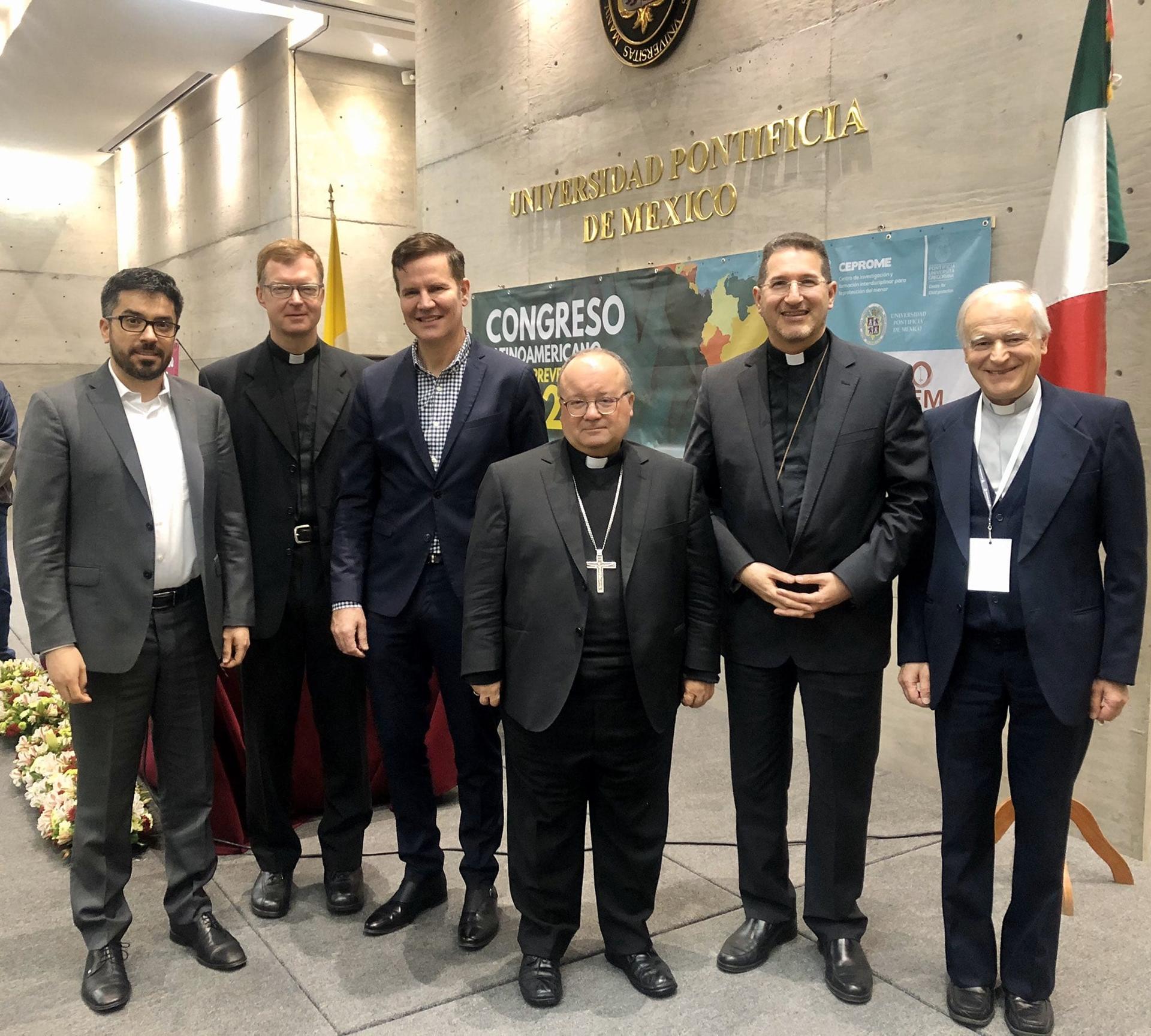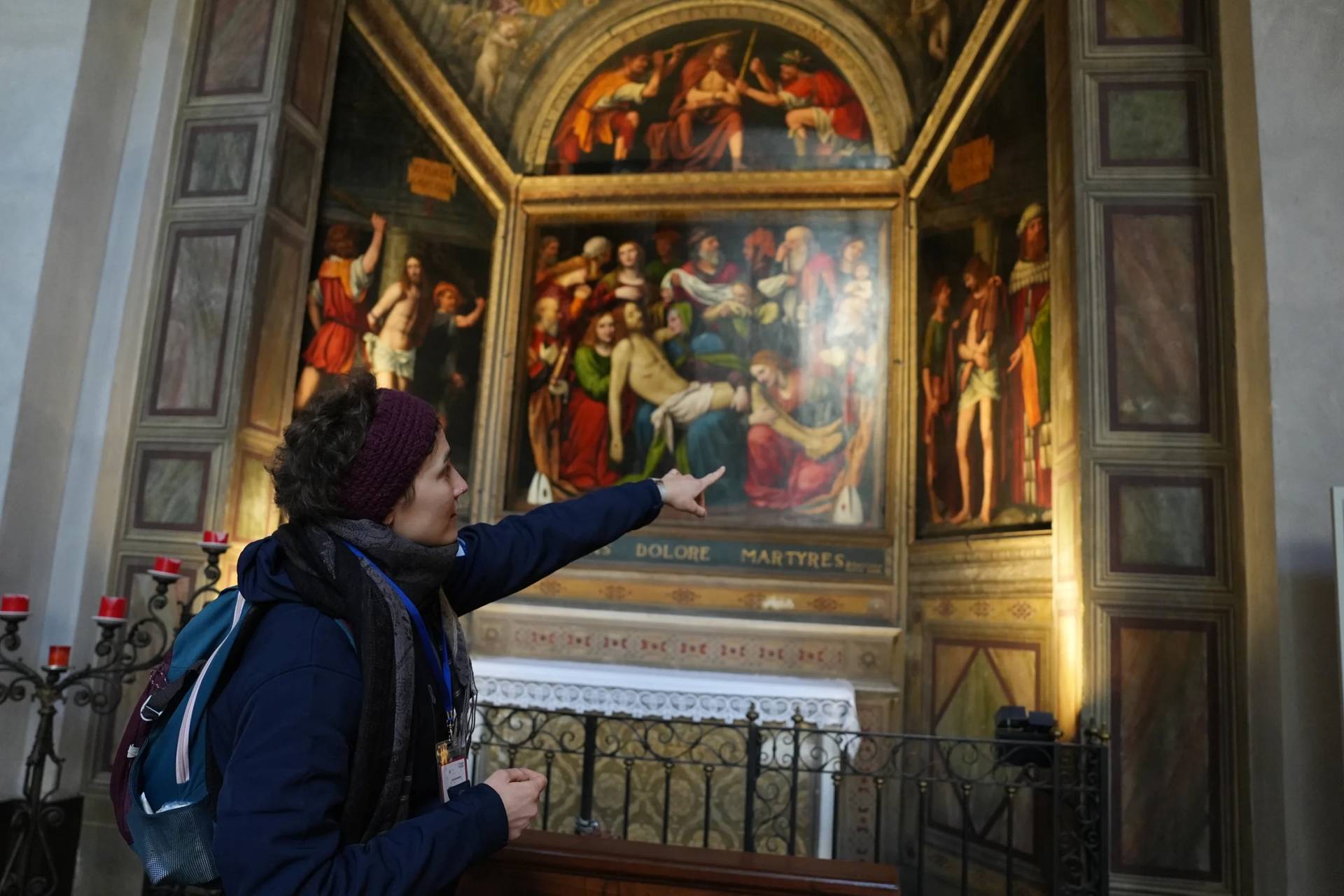MEXICO CITY – When the Boston Globe released a shocking series of news stories about the clerical sexual abuse scandals in the city of Boston in 2002, Father Daniel Portillo was a seminarian.
When Mexican Father Marcial Maciel, the disgraced founder of the Legionaries of Christ who was found to have abused minors, died in 2005, Portillo was in Rome and saw how some members of the order founded by the late priest still labeled him a saint.
When the Catholic Church in Ireland was shaken to its core due to further revelations of the scope of the clerical sexual abuse crisis in the Emerald Isle in 2009, Portillo was being ordained a deacon.
Today, ten years after his ordination, he leads a ministry that is shaped by these events: He is the founder of CEPROME, an interdisciplinary center for child protection in the Pontifical University of Mexico.
The center organized a Nov. 6-8 workshop on child protection in Latin America.
Speaking with Crux on Sunday, Portillo talked about the seminar, but also about the impact the clerical abuse crisis has had on him.
“I wonder sometimes if we truly understand the seriousness of the problem, and I believe we don’t,” he said. “I don’t want to sound insensitive, but it feels like when a person finds out they have stage one cancer: They sometimes prefer not to talk about it, denying the diagnosis instead of accepting reality.”
Portillo also acknowledged that if he were a layman with children today, he’s not sure he would “continuously try for my children to be Catholics tomorrow, with a church that is not able to be transparent on these things or its finances.”
What follows are excerpts of Portillo’s conversation with Crux.
Crux: What did you think of the course? Was it what you expected?
Portillo: I feel very grateful to God, especially for the experience of being able to meet different people and institutions that are working for the same mission. Second, expectations exceeded what we thought might be, especially in regards to the active involvement of participants and also with the interest of the speakers, not only for their interventions but also for wanting to listen to the others. In addition, outside the classroom, we continued talking and talking, going deeper.
There was a team that helped us to make an evaluation, through interviews, of the impressions of the participants. The impressions were very favorable, with the request that it continue for a week. Also, the bishops gave themselves the opportunity to keep listening.
In a word, I think it was a learning environment for everything, and a reminder that in the prevention environment, we can always continue learning, keeping ourselves actively listening.
What are the challenges going forward?
The first is that of synergies, that is, although connections are being established in different countries, it remains a strong challenge to maintain these synergies and the collegial spirit amongst the different institutions. Second, lifelong learning, that is, not to conform to what we know today, but to keep up to date with what other institutions are developing in their environments. And another is a strong and frank decision on the issue of fighting for the Church. This may not be possible, but we are facing one of the most critical situations in the Church.
What does it mean for you to fight for the Church?
That in the face of disillusionment due to the cover-up, in the face of disillusionment due to specific cases of abuse, to remain part of the Church is not easy, because to remain a priest of a church that has concealed, that has been negligent, is not easy.
In other words, to cover up is not to protect?
Exactly. It would be the opposite of protecting. And in this sense, it is important that we realize that prevention is a mission of the baptized. If we think that prevention is hierarchical, nothing will ever be done. Prevention is essential, a right of humanity, and also a mission of the baptized. From Evangelii Gaudium we can even sustain it …
It hurts to know priests in our generation or people we went to seminary with have sexually abused children. That is very painful.
We have to understand that, whoever has a “membership” in the Catholic Church, has to understand that part of our calling ourselves Catholics is to be part of the ministry of prevention in the Church.
Monsignor Ali Herrera, during one of his presentations, said that while the “gringos” went forward, Latin America did little or nothing. Do you agree with his diagnosis?
Yes. Even today, it is shameful to know that there are countries that have done nothing. That is, absolutely nothing.
That is to say?
That they have not begun to generate awareness, nor have they begun to recognize the damage we have caused nor the guilt we have; that we are not thinking about what we can do to address this. And we [as CEPROME] know it, because it is where it is most difficult for us to enter.
Any example of a country in Latin America where nothing has been done?
Honduras.
Where is CEPROME going now?
Towards generating synergies and collaborations with different countries, especially with people who are establishing commissions within national episcopal conferences or coordinating diocesan or congregational commissions.
We want to establish the Latin American council rooted on four fundamental principles: Synodality, collegiality, transversality and interdisciplinarity – all of which are essential to us.
As members of the Church, we have all been part of this problem, and as such, we are all called to help solve it. We cannot leave it in the hands of a few. I believe that every person can contribute something, and as small as that contribution is, it adds up. We cannot foster a principle of exclusivity, according to which only a handful – for instance, canon law experts or specialists – can contribute to ending this.
We need to serve everyone. There is a good population of baptized brothers and sisters who are hurt and disillusioned with their Church, because even today, their Church has not provided a truthful report of what has happened.
As a Catholic, I feel disappointed that, to this day, our church has not told me what has happened. We have been informed by others, including the media, and they brought us closer to reality, to understanding the scope of the crisis. But it adds to the pain, being told by “outsiders.”
Even today, we still don’t know what happened to former Cardinal Theodore McCarrick, who was removed from the priesthood earlier this year, after being found guilty of sexually abusing seminarians …
And it is the same story. In trying to “protect” the institution, often an even bigger scandal is generated. In that sense, I think we have a very large debt, and as I said during my talk, the debt is not only with primary victims, but with the whole community of believers, because we have not been clear with them.
If one member suffers, they all suffer …
Exactly. I do wonder if [sometimes in the Church] suffering is understood as masochism. We continue to hurt, instead of thinking what can we do to alleviate the suffering of the other, by being clear with everyone. In what way can we alleviate the suffering of the other? By being clear with everyone. Let people know that the Church speaks head on and with clarity.
It is very strange to realize that behind this whole issue, we found other issues that we did not figure on or imagine as being at the origin of all this. Because this is not just a matter of sexual behavior. That this continues to happen today, is an ecclesial thermometer.
Clericalism, abuse of power …
Yes. Ali spoke about it as a question of toxic environments. It is knowing that there are dynamics among us that are hurting us and are damaging the Church, some of which are not of a sexual nature. People are leaving the Church and we are turning a blind eye.
By continuing to believe that they are not leaving the Church because of its failures, but because of secularization?
Exactly. What has become evident nowadays is that there isn’t a good ecclesial disposition to respond to the crisis. If this is truly the biggest crisis of the Church, I wonder, how is it possible that knowing what the Church is suffering, this situation still remains unknown and unaddressed in some parts of the world?
I wonder sometimes if we truly understand the seriousness of the problem, and I believe we don’t. I don’t want to sound insensitive, but it feels like when a person finds out they have stage one cancer: They sometimes prefer not to talk about it, denying the diagnosis instead of accepting reality.
In some realities we also find a nostalgic church, one that is living in the past without a projection towards the present. Any document of ours, any synod or any aspiration we have, if we don’t see the future of the Church we seek or want, nothing is achieved. Ecclesiologically speaking, what church we believe in and what church we want to leave to our next generation.
If I were a layman and had children, as things are today, I don’t know if I would continuously work for my children to be Catholics tomorrow, with a church that is not able to be transparent on these things or its finances.
You’d want for them to believe in God, but not necessarily as members of the Church?
Exactly. And we currently see young people who are willing to question the Church, and it makes us go on the offensive. But the Church that we have left for them … Is one that must be questioned, because it is hard to accept that we have allowed this much perversion into it.
Follow Inés San Martín on Twitter: @inesanma
Crux is dedicated to smart, wired and independent reporting on the Vatican and worldwide Catholic Church. That kind of reporting doesn’t come cheap, and we need your support. You can help Crux by giving a small amount monthly, or with a onetime gift. Please remember, Crux is a for-profit organization, so contributions are not tax-deductible.














